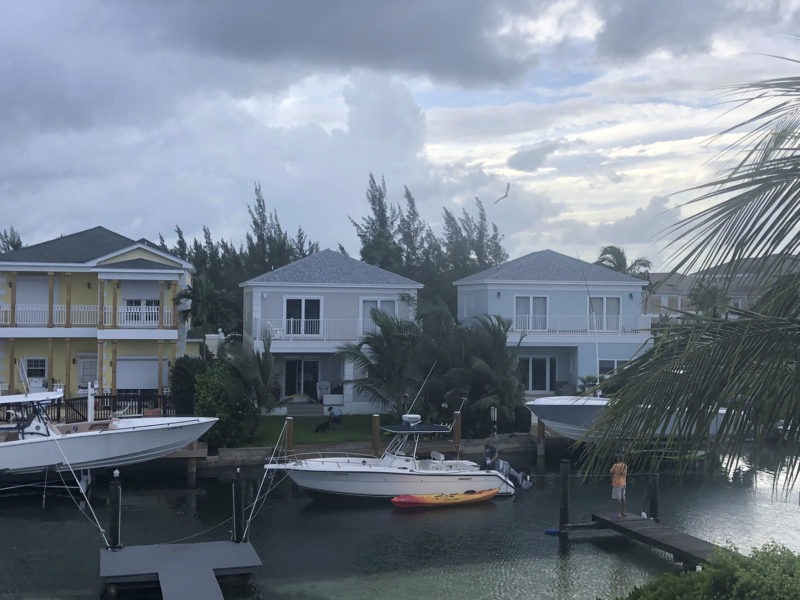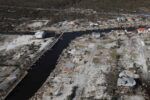Dorian bears down on Bahamas as catastrophic Category 5 hurricane
Boats tied up in preparation for the approach of Hurricane Dorian on September 1, 2019 in the Bahamas capital Nassau (Lucy WORBOYS)
Miami (AFP) – Hurricane Dorian closed in on the Bahamas Sunday as a catastrophic Category 5 storm that forecasters said will pummel the low-lying island chain with devastating winds, towering storm surges and torrential rains for 30 hours or more.
The slow-moving storm was packing sustained winds of 175 mph (280 kph), gaining in power as it bore down on the Bahamas’ northern Abaco islands 35 miles (56 km) away.
“The eyewall of #Dorian is reaching the Abaco Islands. Residents there should take immediate shelter,” the Miami-based National Hurricane Center tweeted.
Many residents of the Abaco Islands were reported to have opted to ride out the monster storm rather than heed government warnings to evacuate.
The Nassau Guardian quoted local resident Troy Albury as saying 150 people stayed behind in Guana Cay, in the center of the Abaco islands, to face the storm’s fury. Only eight left on the last ferry out, he said.
Power went out as the storm approached, a resident of Man-o-war Cay in the Abacos told AFP.
“You’re talking a major hurricane over the Bahamas for 30 hours plus,” said NHC director Ken Graham on Facebook Live.
“That’s major hurricane winds, that’s storm surge of 10 and even 20 feet in some of those areas,” he said. “That’s also torrential rainfall of 15 to 20 inches, isolated 30 inches.”
Florida residents, meanwhile, were bracing for a potentially dangerous brush with the storm, which forecasters say is expected to make a slow turn north after passing the Bahamas, and then move up along the US east coast.
Tropical storm warnings were in effect for parts of the Florida coast.
The NHC said Dorian would “move closer to the Florida east coast late Monday through Tuesday” but exactly where — and how hard — it will strike the US coast looked uncertain.
In Grand Bahama, businesses were boarded up and thousands have evacuated Dorian’s predicted path.
“There are beautiful skies right now but it feels like we are standing in a line waiting for a beating,” Yasmin Rigby, a resident of the island’s main city Freeport, told AFP.
“Outside is calm, with not many people on the road. People are battened down awaiting the storm; some are still getting last minute items. Many are already in shelters.”
According to Rigby, memories of past hurricanes were still fresh — including 2005’s historic storm Wilma when it took weeks for water, food and electricity to be back to normal.
The storm’s leisurely pace, coupled with the storm surge predictions, poses a fearful prospect for many of the islands, some barely feet above sea level.
Still, Rigby was among the Grand Bahamians who said they intend to ride the storm out.
– ‘Very great danger’ –
Government offices in the Bahamas were closed as people rushed to prepare for a storm they were told could prove catastrophic.
“The price you may pay for not evacuating is your life or other serious physical harm,” Prime Minister Hubert Minnis warned residents.
Donald Trump, who canceled a high-profile trip to Warsaw to focus on storm preparations, was due to receive an updated hurricane briefing from the Federal Emergency Management Agency on Sunday.
Kevin McAleenan, acting homeland security secretary, said hurricane force winds could hit Florida, followed by a prolonged rain event, combined with a storm surge.
“That’s going to be very difficult as the storm starts to move northward, mostly like, up the coast of Florida and toward Georgia and South Carolina,” he said on ABC’s “This Week.”
While Miami appeared likely to be largely spared, 30-year-old David Duque, picking up sandbags there on Saturday, noted “everything could change… I know it could be a scare, but better prepare instead of doing nothing.”
The Florida National Guard said roughly 2,000 service members had been mobilized, with another 2,000 poised to join them.
– ‘Absolute monster’ –
Trump has declared a federal state of emergency in Florida, authorizing US assistance to supplement state and local efforts.
Following a similar state order in Florida, South Carolina Governor Henry McMaster declared a state of emergency Saturday, saying, “Given the strength and unpredictability of the storm, we must prepare for every possible scenario.”
Neighboring North Carolina also declared a state of emergency, and Georgia announced a state of emergency for 12 counties.
The US Coast Guard said large commercial vessels should plan to leave ports from south Florida to Savannah, Georgia, and advised pleasure craft to seek safe harbor.
Orlando International Airport was to protectively halt commercial flights at 2:00 am (0600 GMT) Monday, and Florida’s NASA Kennedy Space Centre said it was moving an enormous mobile rocket launcher inside to protect it.
Disclaimer: Validity of the above story is for 7 Days from original date of publishing. Source: AFP.


